|
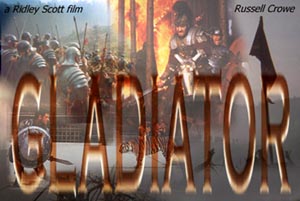
Directed
by Ridley Scott (you know, the first Aliens movie, Bladerunner).
Also stars: Djimon Hounsou (Juba), Joaquin
Phoenix (Commodus), Oliver Reed (Proximo Palindromos),
Richard Harris (Marcus Aurelius), Connie Nielson, Vinnie Jones,
Ralph Moeller, Derek Jacobi, Spencer Treat Clark, David Hemmings,
Tomas Arana.
Screenplay: David
Franzoni
Click here for fan reviews
Cinescape
~ Films Unlimited ~ Premiere Magazine ~ Entertainment Weekly
~ More Articles
Sequel?
The
following Cinescape article couretsy of
4tune. (Typos courtesy of petshark)
|
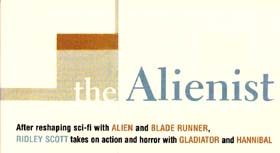
Working with
Ridley was like doing quantum physics with Picasso,"
says Gladiator star Russell Crowe. "It was impressive,
mate."
The Australian actor's simile is quite apt: Ridley Scott
is famous for infusing nuts-and-bolts filmaking with
an artist's visionary aesthetic. In 1979, he turned sci-fi
on its ear with Alien, a claustrophobic space fright-fest;
three years later, Scott would revolutionize the genre entirely
with Blade Runner. The baroque noir's bleak vision of the
21st century- a rain-slicked metropolis overrun by soul-crushing
technology-- has been replicated (or, as some would say,
ripped off) in countless films ever since.
But althought these two groundbreaking sci-fi films made
Scott's name synonymous with slick, visually arresting moviemaking,
most of his later works-- with the notable exception of
the 1991 chick-flick-gone-haywire Thelma & Louise--
were rather forgettable exercises in style over substance.
Legend, 1492:Conquest of Paradise, White Squall and GI Jane
all failed to impress critics or cause significant ripples
at the box office.
Now, however, it looks like Scott is poised to rock Hollywood
yet again. He's currently putting the finishing touches
on Gladiator, a $100 million epic starring the red-hot Crowe
as a Roman warrior in 180 AD. 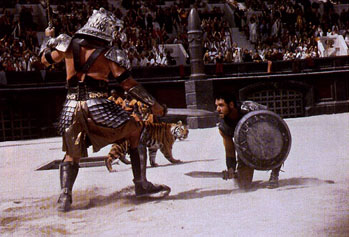 After
that, he'll tackle a screen adaptation of Thomas Harris'
controversial Silence of the Lambs sequel, Hannibal, which
is currently undergoing script rewrites (the final
screenplay will determine whether or not Anthony Hopkins
and Jodie Foster reprise their Oscar-winning Lambs roles).
When Cinescape caught up with Scott on cell phone, the director
was driving to his London office for some Gladiator post-production
work. While scooting through traffic, he discussed his childhood
influences, his interest in a new sci-fi project and what
we can expect from this summer's Gladiator and the upcoming
Hannibal. After
that, he'll tackle a screen adaptation of Thomas Harris'
controversial Silence of the Lambs sequel, Hannibal, which
is currently undergoing script rewrites (the final
screenplay will determine whether or not Anthony Hopkins
and Jodie Foster reprise their Oscar-winning Lambs roles).
When Cinescape caught up with Scott on cell phone, the director
was driving to his London office for some Gladiator post-production
work. While scooting through traffic, he discussed his childhood
influences, his interest in a new sci-fi project and what
we can expect from this summer's Gladiator and the upcoming
Hannibal.
When you were growing up as a kid, what kinds of
movies did you enjoy?
I think my father was starting to get worried about me because
I wanted to be a cowboy until I was almost 17. I was an
avid rider. We [were] living in Germany [and] my father's
[business] colleague was a Texan who had a ranch, so suddenly
I felt I had the real possibility of becoming a cowboy.
So I think the person I really admired from when I was about
9 years old through 'til I was about 13 was Roy rogers.
I loved Roy Rogers more than anyone else. It was partly
the clothes and partly the gun and the trappings. I was
desperately, avidly involved in Westerns, and of course,
I haven't [directed] a Western yet. I think at some point
I will. Bit [I'm] trying to find a Western that will mean
something for today's audience. It is difficult, but everything
at the end of the day comes down to story, story, story
and then character, character, character. If you can get
the story right, and the characters follow, then I think
it will be good for any audience at any time.
Were there any particular movies or film-makers
that influenced your work?
there are a whole bunch of [directors] from the 40's:
Michael Powell, Orson Welles, David Lean. Then I started
to discover foreign films, so there was [Akira] Kurosawa.
I think they are the main influences.
While you were making Alien or Blade Runner, did
you evere think that you would have such a lasting impact
on modern science fiction-- that kids in film school would
be studying your work?
No. Not really. You never do, you know. You don't think
about that. All I remember [about making Blade Runner] was
getting beaten up [emotionally]. It was a hard shoot. It
was a difficult process because it was the first time I
had ever made a film in Hollywood, even though I had previously
made alien. Alien was all filmed in London. So Blad Runner
was my first Hollywood experience in that I was driving
through the gates of the studio every day. I thought, "this
is fun. God, I never thought I'd ever get to do this."
That was the best news. The bad news followed.
What was the bad news?
It was a hard introduction. I was the new kid on the block.
My methods of making movies-- and at that moment I had done
two [alien and the Duellists], so I wasn't a babe-- were
different. I found it a little hard to come in initially.
I found the structure and the way of working different.
So it was a matter of me getting used to them and them getting
used to me.
I understand that you're doing some restoration
work on Blade Runner.
We're remixing and reprinting Blad Runner in January. We've
been going through the old negative and we're adding a few
scenes back into it because the film, according to Warner
Bros., gets requested about 30 times a year [by repertory
theaters]. So the prints were getting used up and they wanted
to update everything. We'll add about eight minutes back
in. But we're going to mix the whole thing and [make a new
print], which will be inetresting because, you know, prints
start to fade after about 10 years. It's pretty great. One
of the great things [is being able to use] this high-definition
digital DVD, which is one way we're managing to preserve
the original look and sound of how the film was meant to
be.
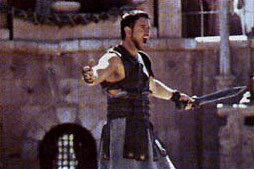 Would
you say that you enjoy working on science fiction films? Would
you say that you enjoy working on science fiction films?
Yes. I've only done two, but I would certainly like to do
another. Again, the biggest problem is finding the story.
I think I've found [a project] very recently. It's not science
fiction in the conventional sense. It's not ray guns. It's
sociological. It's futuristic in the sense that Blade Runner
was futuristic. It takes place in about 2020, which I like
because most of the audience can look to 2020 and say "I'll
be around then." So it's tangible. It deals with a
kind of future history because it's a prediction which may
happen. So it's cautionary, as well. We have to caution
ourselves and re-examine what we're doing at the moment.
I've only just begun [thinking about the story], but I'm
hoping that something will come from it. This just occurred
earlier this week, so I'm quite excited, actually.
Is Gladiator your most action-oriented film?
I think you'll [have to] see it. It's got a very interesting
combination of things. It has a strong narrative, which
takes the main character through events that inevitably
are involved in the gladiator arena.
We start the film off [in Germany]. Germany was the one
territory that just woulnd't succumb to the Romans. [The
Germans] wouldn't go away. So Marcus aurelius spent about
17 years on the German front [with his troops]. Can you
imagine that? Seventeen years on the German front in those
dark forests.
We start off with a 13-minute battle at the beginning of
the movie, which also shows the frustrations and self-searching
of Marcus Aurelius. Towards the end of his life he got even
more philosophical, wondering if he'd dealt with his life
in the right way. His closest aly and confidant is General
Maximus, who is played by Russell Crowe. So there's an interesting
context and some very good performances [amidst the action].
What else can you tell us about Gladiator's plot?
The story is quite intriguing and unusual for this kind
of epic. As opposed to just reproducing history, we wrote
a story into history, and actually did adopt certain factual
characters such as Marcus Aurelius, his son Commodus [Joaquin
Phoenix] and daughter Lucialla] Connie Nielsen]. We also
added a very interesting character, a slave trader named
Proximo, who is played by Oliver Reed.
the title describes the central character, who is Maximus.
He's a general in the Roman army who is betrayed by politics
and hierarchy [after Commodus has Marcus Aurelius killed.]
He finds himself sold as a slave and eventually comes back
into Rome as a powerful gladiator.
 Your next project is Hannibal,
the sequel to Silence of the Lambs. Any word on when you'll
go into production? Your next project is Hannibal,
the sequel to Silence of the Lambs. Any word on when you'll
go into production?
We are aiming to get started shooting around mid-March or
the beginning of April. The middle act will be shot in Italy.
the rest of the film will be done in the Eastern US-- North
or South Carolina [or] Virginia, near Washington, D.C.
Will Jodie Foster and Anthony Hopkins reprise their
Silence of the Lambs roles?
At this juncture, I have no idea. I hope that they do.
Is it true that the ending of your film will be
different than the ending of the novel?
the fact that Starling goes off with Lecter [in thomas Harris'
book] is, well... a little hard to ... swallow is the wrong
word. It's difficult. We've come up with another solution.
Which you can't tell me about, right?
Right.
Following up Silence of the Lambs won't be easy.
Was it hard to say yes to the project?
I didn't hesitate.
Back
to Top
From Films
Unlimited
An early
review of Ridley (Blade Runner) Scott's long-awaited toga
epic Gladiator has surfaced at reel.com.
The critic, dubbed Surfbrat, describes the film - which
stars Russell Crowe and the late Ollie Reed - as "in
every way the perfect sword-swinging, super-violent popcorn
epic. The best acting chops belong to Crowe for his fierce
and bitter potrayal of the revenge-driven Maximus".
"The big, intense battles in the coliseum bring Ridley
Scott back to true form. The backdrops are gorgeous. Everyone
in the audience applauded after each brutal battle. They
laughed in all the few cheeky parts. It never got cheesy.
It was a spectacle!"
Worried that his review might suggest a prejudice in favour
of gladiatorial cinema, 'Surfbrat' concludes, "I am
not, by the way, a big fan of the sword-and-sandal genre.
I've never seen Ben-Hur or Spartacus, but am tempted to
rent them after seeing this!"
Back
to Top |
|
Let the games Begin! Russell
Crowe, Joaquin Phoenix, and director Ridley Scott throw
a toga party in "Gladiator"
by Alex Lewin
Article here courtesy of 4tune
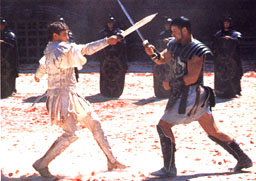 If you
were working on the Gladiator set, you knew to keep
away from the French tigers. Of the four Bengals brought
in for a Colosseum battle scene, two were from the United
States and two were from France, The latter were "less
people-friendly,? as stunt coordinator Phil Neilson puts
it. Others are less diplomatic. "F**kers," director
of photography John Mathieson says. "We didn't go anywhere
near those. The (American tigers) were pussycats."
But, he adds, "even the pussycats could be f**kers."
Case in point: Blood was drawn when the tiger bit through
the steel cuff on the arm of trainer Randy Scott Miller,
who stood in for star Russell Crowe during scenes that required
human-to-tiger contact. "It left a hole in the steel
the size of a quarter," director Ridley Scott recalls.
"Went straight into his arm. And the guy said, "'Has
anybody got any iodine?' Then he slapped it around and fed
it." If you
were working on the Gladiator set, you knew to keep
away from the French tigers. Of the four Bengals brought
in for a Colosseum battle scene, two were from the United
States and two were from France, The latter were "less
people-friendly,? as stunt coordinator Phil Neilson puts
it. Others are less diplomatic. "F**kers," director
of photography John Mathieson says. "We didn't go anywhere
near those. The (American tigers) were pussycats."
But, he adds, "even the pussycats could be f**kers."
Case in point: Blood was drawn when the tiger bit through
the steel cuff on the arm of trainer Randy Scott Miller,
who stood in for star Russell Crowe during scenes that required
human-to-tiger contact. "It left a hole in the steel
the size of a quarter," director Ridley Scott recalls.
"Went straight into his arm. And the guy said, "'Has
anybody got any iodine?' Then he slapped it around and fed
it."
The mere presence of live tigers (not to mention hyenas
and lions) suggests the ambitious nature of Gladiator,
a $107 million epic that brings an aggressive authenticity
to what Scott calls “toga-and –sandal movies”—a
type of film that Hollywood hasn’t attempted since
the early ‘60s. At the center of the story—based
in part on real people and events—is Maximus (Crowe),
a Roman general who in 180 A.D. is banished to the gladiators’
arena to die when his rival, Commodus (Joaquin Phoenix),
ascends to the throne of the Roman Empire. Gladiators, however,
can fight their way to freedom, and Maximus won’t go
down easily.
A genre that reached its peak with Spartacus and
Ben-Hur--and its valley with 1963’s Cleopatra,
on of the great cinematic flops—ancient historical
epics fell out of fashion because their costs ballooned
as their popularity deflated. “The challenge [on Gladiator]
was to reproduce the grand scale without bankrupting the
studio,” production designer Arthur Max says. DreamWorks
cohead of production Walter Parkes, who spearheaded the
project for the studio, feels the time is right again for
this type of epic. “In the past 10 years there have
been successful movies that reintroduced classic genres
to audiences,” he notes. “Titanic was a
throwback to historical melodrama that even five years earlier
would’ve been looked upon as a marginal bet. And we
have the digital tools to re-create worlds in ways that
weren’t available years ago.”
Gladiator began with a pitch by screenwriter David
Franzoni, who was working with DreamWorks on Amistad
at the time. And excited Parkes took the idea to Scott,
who is known for the brilliant, otherworldly action of such
films as Blade Runner and Alien. At their
first meeting, Parkes held up a copy of a painting called
Pollice Verso (“Thumbs Down!”), by 19th-century
French artist Jean-Leon Gerome. It shows a gladiator standing
over his wounded opponent in the Roman Colosseum while excited
spectator vote for a kill. “Basically, Ridley looked
at the picture and said, ‘I’m doing the movie,’”
producer Douglas Wick (Girl, Interrupted) recalls.
“Walter knew how to get me,” agrees Scott, who
studied painting at the Royal College of Art, “Because
I love to create worlds.”
The casting represents a collaboration of two generations.
Crowe was Scott’s first choice to play Maximus, and
he signed on before anyone else—before filming The
Insider, in fact. Connie Nielsen (Mission to Mars)
plays Commodus’s not-so-loyal sister, Lucilla. And
for Commodus himself, whom Scott describes as “a wounded
individual whose father was never with his son,? Phoenix
(8mm) was chosen. “I like the bad guys to be
sympathetic,” the director says. Alongside the newer
faces, Scott casts an older cadre of Britain’s finest:
Richard Harris plays Commodus’s father, the famed Roman
emperor Marcus Maurelius; Derek Jacobi appears as a senator;
and Oliver Reed, who died suddenly new the end of production,
was cast as Proximo, Maximus’s trainer-owner.
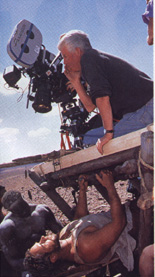 The production itself was something of
an odyssey. The six-month shoot began in the woods outside
Aldershot, in southern England, which doubled for the German
front in the film’s opening battle, between the Roman
army and Germanic tribes. Then it was off to Morocco for
about three weeks; then Malta, where most of the filming—including
the Colosseum battle scenes—too place. Malta was the
ideal location because it had a ruined fortress several
hundred years old, which the filmmakers used as a jumping-off
point in reconstructing ancient Rome. “We created a
portion of downtown Rome by building large structures in
relation to existing structures,? Production designer Max
says. “Wherever there was a gray area in the history
books, we invented. Napoleonic and Fascist design were influenced
by the ancient Romans, so we drew upon Napoleonic historical
paintings and Triumph of the Will.” The production itself was something of
an odyssey. The six-month shoot began in the woods outside
Aldershot, in southern England, which doubled for the German
front in the film’s opening battle, between the Roman
army and Germanic tribes. Then it was off to Morocco for
about three weeks; then Malta, where most of the filming—including
the Colosseum battle scenes—too place. Malta was the
ideal location because it had a ruined fortress several
hundred years old, which the filmmakers used as a jumping-off
point in reconstructing ancient Rome. “We created a
portion of downtown Rome by building large structures in
relation to existing structures,? Production designer Max
says. “Wherever there was a gray area in the history
books, we invented. Napoleonic and Fascist design were influenced
by the ancient Romans, so we drew upon Napoleonic historical
paintings and Triumph of the Will.”
And upon Scott’s own sketches, known as “Ridley-grams”
to veterans of his productions. “If he talks to a carpenter,
he’ll do a little diagram, saying, ‘That’s
how I want it,’” storyboard artist Sylvain Despretz
says. “He would give Arthur Max piles of sketches on
the backs of script pages.”
Rebuilding the entire Colosseum was, of course, out of the
question, but the crew constructed one side of the amphitheater
and two of its tiers; the rest was filled in with computer-generated
imagery. “We used a combination of old, traditional
film tricks and high-tech trickery,” Max says.
He rattles off the accomplishments of his crew, which he
estimates reached 1,000 workers at its peak: “We had
to equip an army, a palace, a senate, several senators’
houses, a slave market, a provincial gladiatorial amphitheater,
a gladiator school in both Morocco and Malta, and all of
their equipment, weapons, wagons, chariots. Not to mention
underneath the Colosseums, which we called the bowels, where
gladiators were held in holding pens, and mechanical lifts
raised lions and tigers up to the floor of the arena.”
All of this work was made more difficult by the iffy weather.
“Everything had to be brought in by ship,” says
Max, referring to the lack of lumber and equipment available
in both Malta and Morocco. “We were building in the
winter in an El Nino sort of year, and very often storms
kept the shipments from arriving on schedule. Some of it’s
still sailing around the Mediterranean looking for us.”
Like the sets, the script was never totally on schedule.
The first draft was written in 1996 by Franzoni, but screenwriters
John Logan (the Ridley Scott—produced HBO film RKO
281) and William Nicholson (Firelight) were brought
in to do rewrites. “This was a work in progress up
until the final day of shooting. “Franzoni says. “Bill
Nicholson was literally writing six feet ahead of Ridley’s
shooting.”
“We could have done with a
bit more time on the script,” one crew member says.
“We’d have to go back and do scenes that hadn’t
really been settled on. Lines had been put in or we’d
want to change the significance of the scene. Things got
rigged and taken down again.”
The motivation for some of this script work was to keep
the star happy. “[Crowe] came back from [The insider],
and I guess he should’ve been watching the script as
it went along. He was upset,” Franzoni says. “He
felt his character didn’t have the vitality that it
originally had. He get…”—Franzoni chooses
his words carefully—“…straightforwardly intense
about it. Russell’s character needed to be amped up,
and it got amped up.”
While some felt that Crowe could be demanding and temperamental
on the set (“he was a bit of a star,: says on crew
member. “I wouldn’t cherish doing another film
with him”), Scott laughs off the question of whether
the actor was easy to work with. “The good ones never
are,” he says. “I like a bit of rock ‘n roll.”
He and Crowe did disagree about Crowe’s accent: The
actor wanted to use a Spanish accent to reflect his character’s
origins, but everyone else was set to speak in classical
English accents. Scott won that debate. “I didn’t
want him to say Barthelona,” Scott says. “We’re
already taking this giant walk down a toga-and-slipper path.
We didn’t need more complications.”
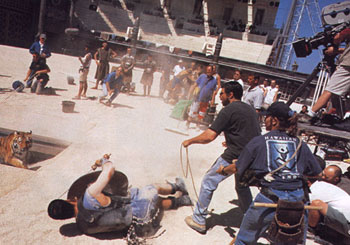 Indeed, the crew had enough to deal with
during the movie’s elaborate battle scenes, some of
which took as long as two weeks to film. Crowe trained for
nearly a month before shooting (he had to drop the 35 pounds
he gained for The Insider and continued to train
and rehearse during production. “Russell’s very
physical,” stunt coordinator Phil Neilson says. “He
did all his own fight stuff; he did 95 percent of his horse
stuff.” Indeed, the crew had enough to deal with
during the movie’s elaborate battle scenes, some of
which took as long as two weeks to film. Crowe trained for
nearly a month before shooting (he had to drop the 35 pounds
he gained for The Insider and continued to train
and rehearse during production. “Russell’s very
physical,” stunt coordinator Phil Neilson says. “He
did all his own fight stuff; he did 95 percent of his horse
stuff.”
For Phoenix, his sword fight with Crowe was the shoot’s
highlight. “We rehearsed separately; the first time
we did [together] was when we shot it,” he says. “I’ve
never been much for sports or anything, but I had a blast.”
To give everyone a forum for blowing off steam during the
arduous shoot, Crowe frequently hosted dinners for the cast
and crew and took them to soccer games and horse races.
“Not just the actors and the producer,” Connie
Nielsen says. “He brings people from the crew, which
is so nice about him. He’s gracious and giving.”
Phoenix agrees. “If anybody’s ever been a big
brother to me,” says the actor (who lost his big brother,
River, in 1993), “it was Crowe.”
The entire production team was dealt a severe blow when,
last May 2, costar Oliver Reed (Women in Love, Oliver!)
died of a heart attack while patronizing a local pub. “It
was a weekend, and I wasn’t working,” Nielsen
recalls. “Ridley told me this had happened, and we
were all in shock. We made a sort of dinner get-together
where we all sat and talked about it. Two days after, we
had to start again. And he was no longer in his trailer.
It was sad.”
“He was a hero to me as a kid,” director of photography
Mathieson says. “Some people say you shouldn’t
meet your heroes, but he wasn’t disappointing to me
at all. I thought he was an excellent fellow. Warm, kind
generous.”
Scott, who knew Reed for 27 years, likens him to another
prodigiously talented and famously raucous British star,
Robert Shaw (Jaws, The Sting). “I don’t
know what made that generation, those guys,” he says.
“The Robert Shaws of the world are disappearing.”
Most of Reed’s scenes had been filmed, so the movie
itself wasn’t affected greatly. There is one shot for
which the visual-effects crew inserted a close-up of Reed
from a previous scene and altered it slightly.
Through it all, the director was determined to keep Gladiator
grittier and more authentic than its stylized predecessors,
which he feels suffer from “the old curly-hair-brushed-forward
syndrome. I know they probably did that [in ancient Rome],
but I always relate to the facts of period times;
they’ve still got to get up in the morning, clean their
teeth, wash in the shower—if they were lucky enough
to have one.”
“Within the first five minutes,” co-screenwriter
Logan promises, “you will have forgotten every Victor
Mature movie you have ever seen.”
Back to Top |
April 28th,
article here courtesy of Pachabel
"What's the big deal? Finally, the movie that will
make Russell Crowe a marquee star.
For Crowe, packing on nearly 40 pounds to play The Insider's
Big Tobacco whistle-blower Jeffrey Wigand was a piece of
cake. (Actually, several pieces of cake.) It was shedding
the flab that was that was next to impossible. Not that
Crowe (who scored a Best Actor Oscar nomination for The
Insider) minded. It's just that the actor was on a pretty
tight deadline not only to drop the pounds, but also to
chisel himself into Maximus - the baddest badass in ancient
Rome. "After five weeks of working out I'd only dropped
five pounds," says Crowe. "For some people dropping
38 pounds is nothing, but my cholesterol was ridiculously
high and I had trouble getting out of cars, I was so fat."
Vying to be the first blockbuster of the summer, director
Scott's $100 million Roman action epic tells the swashbuckling
story of Crowe's Maximus - a brave and loyal military general
under Emperor Marcus Aurelius (Richard Harris). But when
the emperor reveals his plans for Maximus to succeed him
after his death, Aurelius' jealous son Commodus (Joaquin
Phoenix) betrays Maximus and has him sent into exile as
a slave. In shackles and with his family life destroyed,
Maximus is trained as a gladiator under the tutelage of
Proximo (Oliver Reed, who died of apparent heart failure
toward the tail end of filming). When Maximus is sent to
Rome to fight in the Colosseum, he begins to plot his vengeance
and gain his freedom. While that simple general-to-slave-to-gladiator
three-act story arc would be more than enough to sustain
most summer fare, Scott and screenwriter David Franzoni
had loftier goals, piling on a few twisty subplots involving
Maximus' enslaved brother-in-arms (Djimon Hounsou), Maximus'
past relationship with the emperor's daughter (Connie Nielsen)
and her plan to restore Rome to democratic rule with the
help of a civic-minded senator (Derek Jacobi).
While Crowe's character is fictional, others are drawn from
the history books. "It's pretty smart," boasts
Scott. "Thankfully, a lot of the story was there in
Roman History, so we didn't have to make too much up."
Still, the director says Gladiator's real surprise is its
lean-and-mean leading man, who he predicts will rocket from
a bristling and brooding character actor into one of Hollywood's
heavyweight stars. "Trust me, if I had to hire Russell
after this movie comes out," says Scott, "I wouldn't
be able to afford him."
Back to Top
Fan
Reviews:
 The movie was never slow or boring. I saw it twice but I
did think the battle scene was a little too fast and blurred.
But Russell Crowe was sexy, magnificent and believeable. The movie was never slow or boring. I saw it twice but I
did think the battle scene was a little too fast and blurred.
But Russell Crowe was sexy, magnificent and believeable.
Rated: Five Crowes
~PJG035
 RC magnificently protrayed a MAN who believed there was life
beyond the thrills and overcoated world of pretensiousness
that exists even today. He was a man of strengh and was
not afraid to love God. He made me believe that men could
still be men and women be women. He exudes the kind of masculinity
that seems to rarely exist these days. I truly believe he
portrays himself to some extent, if not all in all his films.
Maximus is certainlly the best of all, he is a powerful
actor and the best of his caliber. I originally started
out intensely disliking RC but soon came to realize it was
the characters he play(so well) that I really hated (Hando,
Bud, Cort etc.) and to top it off I thought he was ugly.
Not so anymore!!! Gladiator is the film of the century and
RC is the Marilyn of the Millenium. You go RC!!! RC magnificently protrayed a MAN who believed there was life
beyond the thrills and overcoated world of pretensiousness
that exists even today. He was a man of strengh and was
not afraid to love God. He made me believe that men could
still be men and women be women. He exudes the kind of masculinity
that seems to rarely exist these days. I truly believe he
portrays himself to some extent, if not all in all his films.
Maximus is certainlly the best of all, he is a powerful
actor and the best of his caliber. I originally started
out intensely disliking RC but soon came to realize it was
the characters he play(so well) that I really hated (Hando,
Bud, Cort etc.) and to top it off I thought he was ugly.
Not so anymore!!! Gladiator is the film of the century and
RC is the Marilyn of the Millenium. You go RC!!!
Rated: Five Crowes
~carlottading
 Russell Crowe did an excillent job getting into shape after
the movie the Insider. I believe that he is the only man
who could have played the part of the Gladiator. There is
not a lot I can say but he is amazing!!! Russell Crowe did an excillent job getting into shape after
the movie the Insider. I believe that he is the only man
who could have played the part of the Gladiator. There is
not a lot I can say but he is amazing!!!
Rated: Five Crowes
~Just a fan
 What
do you expect from Ridley Scott? We all remember "that"
scene from ALIEN don't we! Even Legio Secundum Augustus
were impressed, despite a few historical blips. This is
serious stuff. Fantastic CGs, even better acting from the
entire cast, I care not what others say. The atmosphere
between RC and Joachin Phoenix could be cut with a knife.
The emotional restraint between RC and Connie Nielson. You're
holding your breath the whole way through. Richard Harris
plays Marcus Aurelius with a certain degree of insight,
as one might expect, we have heard rumour that members of
the cast read the Meditations of Marcus Auerlius prior to
filming. Oliver Reed (sadly missed) was I first thought
an odd choice for Proximo, but having seen the film, he
was perfect ... the ageing artist .. one last show. The
whole thing is a masterpiece. What
do you expect from Ridley Scott? We all remember "that"
scene from ALIEN don't we! Even Legio Secundum Augustus
were impressed, despite a few historical blips. This is
serious stuff. Fantastic CGs, even better acting from the
entire cast, I care not what others say. The atmosphere
between RC and Joachin Phoenix could be cut with a knife.
The emotional restraint between RC and Connie Nielson. You're
holding your breath the whole way through. Richard Harris
plays Marcus Aurelius with a certain degree of insight,
as one might expect, we have heard rumour that members of
the cast read the Meditations of Marcus Auerlius prior to
filming. Oliver Reed (sadly missed) was I first thought
an odd choice for Proximo, but having seen the film, he
was perfect ... the ageing artist .. one last show. The
whole thing is a masterpiece.
Rated: five crowes
--Maggot
NY
Post Online: Russell's
a lot to Crowe about
JAM
MOVIES and CANOE.COM:
What's
Eating Crowe: Gladiator's Russell Crowe
slays Hollywood's protocol
She's
History: Connie Nielsen goes back in time
and joins a Roman boy's club...
Glorious!:
Gladiator a brawling, sprawling cinema spectacle...
Bang
Up Job: Djimon Hounsou...
Roman
Empire Fight Night: Gladiator is no Roman
holiday...
Twisted
Tales and Steaming Entrails: No place
like Rome for blood 'n guts |
|